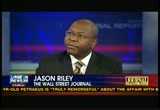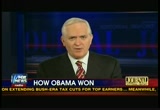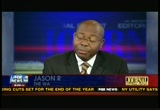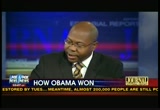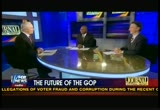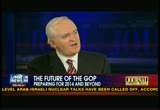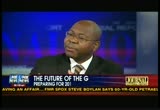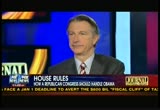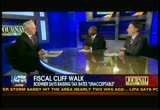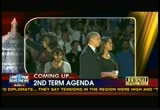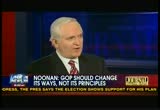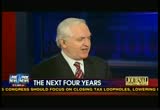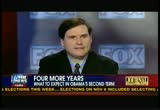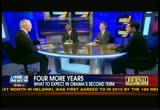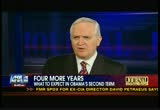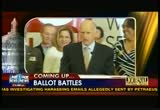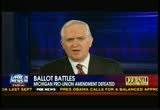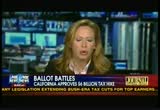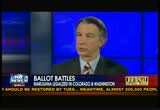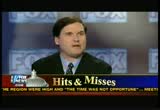tv The Journal Editorial Report FOX News November 10, 2012 11:00pm-12:00am EST
11:00 pm
>> this week on the journal editorial report, a complete post election wrap-up. a look how president obama won a second term and what he's likely to do with it. and plus, how should republicans respond and regroup for 2014 and beyond. from tax hikes to collective bargaining to gay marriage, how some big measures, across the states across the country. welcome to the journal, editorial report. i'm paul gigot, a divided country gave president obama a second chance on tuesday, handing him a narrower, but decisive win over republican rival mitt romney. here is with a look how he did
11:01 pm
it. dan henninger, and jason riley and washington columnist kim strassel. start with you, when you get a defeat like this, there's no one thing necessarily that explains it. but why don't you pick out your most important? >> look, i think there were two things key to the obama victory, one was that very ol on, they ran this very high dollar attack campaign against mitt romney, a bit of a character assassination throughout the summer and mitt romney didn't respond to it and he didn't recover from it. when you combine that with the president's brutally efficient, we now know turnout operation in core states like ohio, virginia and florida, popular vote pretty close in the end. in the end he got out the partisans in much the same numbers in 2008 and that's what won it for him. >> paul: so, kim, you're saying that's about 100 million dollars or more that
11:02 pm
the obama campaign poured on mitt romney on bain capital on his tax returns on the fact that he's a pluto kratt, and making him to be gordon gecko without the social-- and romney, would you agree they made a fatal mistake in not countering the attack ads? >> i think it was the mistake and there was a belief in the romney campaign that somehow if you were responding you were losing, but by sitting back and not doing anything, they didn't have a lot of money and this was the primary season hadn't been opened up to the general campaign dollars yet, but by sitting back, they did allow the president to brand him that way and when you looked at the exit poll numbers and questions people asked, that was certainly the impression left with lots of americans. >> paul: and jason,the romney camp told me in august they didn't feel they had enough money to respond at the time to make either both a positive and defensive message to those ads and they went with the
11:03 pm
positive one and here is what romney will do on day one. and i also think those attacks had a kind of voter suppression impact on some of the lower middle class voters, and explains maybe in part ohio why romney didn't get the same number of votes, 2 million votes, 2 1/2 million votes lower than john mccain. >> i think what stands out about obama's victory to me is how ugly it was, this was identity politics on steroids telling black people republicans wanted to take away their right to vote and telling women there's war on them that seniors, that paul ryan wants to push granny off the cliff in a wheelchair. this is not the hope and change obama, this was not, there's no red state and blue state obama. he won ugly, it's divisive and if this is the template for how democrats want to win elections going forward to this-- >> and i can tell you what the reaction in the white house would be if they heard you say that, they would say get over it, grow up, this is politics,
11:04 pm
republicans got a, you know, put on their boxing gloves and get over it. >> oh, yeah. >> paul: so what? you know. >> i won, you know, suck it up. >> i agree. this is the new benchmark the way you win a presidential campaign. no question about it, it's too bad, but that's the way it is. i want to elaborate on one of kim's points. the turnout machine, it did not materialize after the convention in august. we need to pay a lot more attention to the so-called obama ground game. in some ways, trying to talk about this in neutral terms, it's somewhat analogous to a corporation's marketing campaign for a new product. and they don't just do that overnight. obama kept offices open after the 2008 campaign in iowa, in ohio, in florida, and virginia, these people were working full-time and targeting campuses and they were targeting minority neighborhoods and their target
11:05 pm
groups and they were feeding. >> paul: give him credit for that. >> i am giving credit for that, but you have to understand that obama's policy on things, that jason was just describing, was essentially a propaganda campaign to drive these voters away from the republicans. and they did it by sending them e-mails every week, by talking to them. by holding meetings and by literally physically taking them to the polls. >> paul: when romney, republicans was saying we're going to be able to match that, kim, they were telling you they had a ground game ever bit as formidable and in the end, not only do they not match obama, they didn't match john mccain, fell short of john mccain by a couple million votes, so what happened? >> look, i think their organizational structure was in place, but this again, to get to the way mr. romney ran his campaign. somebody made an interesting point to me this week and said, you know, the very end he wasn't enthusing big crowds, he was enthusing
11:06 pm
people who should have been with them from the start. and when he finally turned after the denver debate and finally got momentum. it wasn't enough time to bring in the undecided voters and people that were sort of marginal in the end because he spent so much of this time, campaign, instead letting obama define him and deciding to run a referendum campaign on the president. >> what about the minority vote, asians, hispanics, jason, they went even bigger numbers for president obama this year, than four years ago. >> oh, sure, i mean, that's-- he got, particularly latinos, this were more of them, they made up larger percentage of the electorate and won more of them. and that may have been the key, particularly in the swing states in the mountain west that george w. bush did so well in, colorado, iowas, your nevadas new mexico. romney did didn't play out there. >> to give you a sense of the magnitude, 8% of the hispanics in 2008 and 10% this year and romney's share went from,
11:07 pm
republican share went to 27 from 31. >> and the romney campaign thought they needed 37% of that hispanic vote for the numbers to win and they got 27%, the arithmetic on the latino vote is just brutal and obvious, they have to do something about that. >> paul: quickly? >> i want today make one more point about the type of campaign at that romney ran. focused on the economy and wanted to make the obama economy, but he woke up wednesday morning and probably saw an exit poll figure that had him devastated for people, 50% of the electorate still thought this economy was george w. bush's fault. it's astonishing. >> it's astonishing. >> and one of the failures, not making a distinction in the campaign, the theme explanation why he would be different than george w. bush. when we come back, the soul searching begins as republicans face another four years of a democrat in the white house and at least two more in the senate minority.
11:11 pm
>> another white house loss for the g.o.p. coupled with their failure once again to take back the senate. many in the party calling for change. what can republicans do to regroup for 2014 and beyond. jason, a wonderful time of the the season, called recrimination. (laughter) >> otherwise known to journalists as shooting the wounded, which is our specialty, so, what, how much trouble is the republican party in? >> they're in a lot of trouble, the coalition needs to expand. it's that simple. there are democrats, the trends in this country, the g.o.p. has to wake up to, and adjust accordingly and i think you have to start with the hispanic vote and this is doable. and between 1996 and 2004, the g.o.p. doubled the percentage
11:12 pm
of the hispanic vote to more than 40%. and they're not natural democrats, not lost to the republican party, they need to be courted-- >> are you saying they don't all naturally want to be part of the 47%. >> what you're saying. >> some republicans talk like that's what they do. >> and this is irrespective of immigration, because the demographic trends are being set by immigrants or by hispanics already in the country. and the not new people coming. >> if you're saying, if you shut down the border now, for the next 50 years, you would still have-- >> not stop. >> paul: all right. >> and percentage grows. >> what should republicans do to appeal to that vote. >> make them feel welcome in the the party. is the the way to go. and of course, they don't always vote on issues of immigration, but that's not the top issue that they vote on, but it's symbolic. >> is this a symbolic threshold issue, if you don't appear open to immigration, they will listen to you on the other things? >> i wouldn't go that far.
11:13 pm
it's just the sense of making them feel welcome in the party and when you have primary debates, whether they should be electrified or a hundred feet tall or get a sense they may not be welcome. >> all right, dan, what about other parts of the coalition? or to what extent is the core republican party principles of small government and social issues, to what extent were those costly here for the party, if at all? >> well, it was a close election. let me see if i can talk about this without it being taken in the wrong way. the white vote in the united states is almost, not wholly republican, but overwhelmingly republican. >> paul: romney got i think 60% of that vote, 61. >> 60% of the vote even among 18 year olds got 52% of white 18 year olds. now, the idea, the media keeps talking about the white vote as though there's weird sort of racial story beneath it.
11:14 pm
there's nothing racial about this, it's about your perception of your own economic self-interest and i think the-- there is no evidence in this election that the republican party's ideas on tax efficiency or certainly even medicare and social security reform did not hurt them among elderly voters at all in florida. that those ideas are not the problem in this campaign. it had more to do with a technical way that mitt romney ran that campaign, and the pt overwhelmingly, the power of the obama turnout machine. but the republicans should not, i think, stand back and say, how do we reengineer our ideas? that was not their big problem in this campaign. >> paul: if you step back, kim, the election was what romney lost 2% of the popular vote, a landslide in the electoral college, but if you changed 300,000 votes in four states, president obama would be president, that's in some way a fool's game because that's the way it always is and not trying to sugar coat the defeat, but the
11:15 pm
republicans now own, i think, 30 governorships around the country. >> right. >> so of course they kept the house, which they-- and they lost only what, about 5, 6 seats after having won 63 two years ago, and despite this being a democratic year. so, can you overdo the republicans woe is us panic here? >> oh, you bet. and democrats, by the way are going to be pushing that, and this is a sound track they roll out. this is, the republicans lost because they're too extreme. first they said that back in 2008 right before they got in the 2010 mid term elections, but the problem here was not the g.o.p. agenda. the problem was romney didn't talk about that agenda much until the last month of the campaign. and as you said, the big success story for the g.o.p. continued on tuesday night is this ownership of a growing number of states in terms of the governorships, the state assemblies, the legislature, and those are governors out there running on the very
11:16 pm
things, tax cuts and spending cuts and pro growth policies voters are listening to that, they're responding by electing these people, but they have to hear the message. >> all right. jason one other thing, the youth vote. >> yes, i think that's another area where i hope the g.o.p. focus is going forward. romney lost the youth vote. these are 18 to 29 year olds to obama by about 20 points this time. i mean, bush only lost the youth vote and the youth vote typically does go democrat, it's just about being competitive. bush only lost to kerley in 9 points and gore less than that. and reagan won the youth vote. the trend is in the opposite direction. >> is that a focus on cultural issues-- or not hip enough? >> i don't know, a conversation with a strategist about this i think that the youth tends to vote on social
11:17 pm
issues and surprising since a lot of them are coming out of college ap the economy looking drab. >> paul: house speaker john boehner extends an olive branch, how much will they branch, how much will they giveif we want to improve our schools... ... what should we invest in? maybe new buildings? what about updated equipment? they can help, but recent research shows... ... nothing transforms schools like investing in advanced teacher education. let's build a strong foundation. let's invest in our teachers so they can inspire our students. let's solve this.
11:20 pm
11:21 pm
boehner vowing to work with president obama on the challenges facing the nation the first the fiscal cliff, a toxic combination of tax increases and automatic spending cuts especially in defense that could take effect january 1st. so, we pointed out in the last segment, republicans held the house with minimal losses despite a big democratic year. can boehner think, look, i've got as much mandate as the president? >> i think he should absolutely think that, paul. the president made clear, didn't really run on the second term agenda and didn't talk about it much. i'll tell you what the mandate is right now, the mandate is that fiscal cliff, the bipartisan mandate. >> paul: to go off it is the mandate or not to go off. >> i think the stock market went off in the last week, people are saying pretty clearly you've got to do something about this now. i think they have a lot of leverage here, because if something isn't done, the economy is going to decline, maybe go into recession and i think employment can get as
11:22 pm
high as 10%. >> paul: if we had another recession it would have. >> if you're the president of the united states in a second term, you do not want a legacy, unemployment-- >> the lesson, don't give in at all, you won and if you go off a cliff, you blame them and they'll get the blame. >> he has no other term. i think obama's going to start thinking about his legacy and i predict he may throw the left over the side to do a deal with the republicans that enhances his legacy. >> paul: kim, is there any evidence from the first term that the president is about to slow the left over the side? and working-- he governs to the left in the first term. is he going to change? >> yeah, and he campaigned to the left, too. one of the problems was that he spent all of this election, the only thing barack obama campaigned on, really, for a second term agenda was his vow to raise taxes on the wealthy. so, now we come back, the day after the election, the white house has already come out and
11:23 pm
said we're not negotiating on that principle at all. and boehner said we're not negotiating on that principle at all so we're going to find out in the next two weeks whether or not there's any room here or if ins a repeat of the debt limit talks in 2011. >> speaking of that, i don't think that boehner wants a repeat of that. there was a sense last year that he got out a little ahead of the caucus and obama was able to exploit that, negotiating within the negotiating. this time i think he's making sure they present a united front and he said he's open to some increase revenue and i hope he holds on the rates, i don't think we need marginal rates increase ins this economy. he wants to negotiate and cut a deal and i think that obama will be inclined to play ball. >> paul: this is the thing. if you look at second terms are notoriously not very effective. what he needs is economic growth. the other thing is, democrats still control the senate, kim. and they control the white
11:24 pm
house and senate and enhanced majority there. and republicans are the minority of the government. they don't really have an obligation to govern. so, what they did with the tea party coming in in 2010, they don't have to pass medicare reform. they don't have to come in with any super agenda themselves. doesn't the president and senate democrats have an obligation to say, here is what we would like to pass, and then see what, if they can actually get it through? >> and the president absolutely does that. and also, too, if there is a potential option in sight to get the senate democrats to go along with it, and the remarkable things to me, paul, they're talking about the standoff. you can see movement over the past year, republicans, you remember, started the debt limit talks in 2011 saying no revenue, never, you will not get it, this needs to be solved through spending cuts alone and they've changed that, saying we're open to revenue, if it's done via larger tax reform in a way that doesn't hurt the economy. the people are being
11:25 pm
incredibly optimistic about it in an ideological way and the president and democrats saying we will not take any revenue unless it's from tax rate hikes. >> and that's going to be part of the showdown, dan, briefly. >> trying to keep the capital gains at 15%, one thing i would take going into the negotiations and i think it would be the one tax rate that would be most productive for the economy, if we start talking about looking for revenue elsewhere. >> if you want the investment down the road. >> coming up in our second half hour, a promise of bipartisanship, but are we likely to see a different president obama in his second term? plus, a good day for democrats, but not necessarily for tdd#: 1-800-345-2550 let's talk about low-cost investing. tdd#: 1-800-345-2550 at schwab, we're committed to offering you tdd#: 1-800-345-2550 low-cost investment options-- tdd#: 1-800-345-2550 like our exchange traded funds, or etfs tdd#: 1-800-345-2550 which now have the lowest tdd#: 1-800-345-2550 operating expenses tdd#: 1-800-345-2550 in their respective tdd#: 1-800-345-2550 lipper categories. tdd#: 1-800-345-2550 lower than spdr tdd#: 1-800-345-2550 tdd#: 1-800-345-2550 and even lower than vanguard. tdd#: 1-800-345-2550
11:26 pm
tdd#: 1-800-345-2550 that means with schwab, tdd#: 1-800-345-2550 your portfolio has tdd#: 1-800-345-2550 a better chance to grow. tdd#: 1-800-345-2550 and you can trade all our etfs online, tdd#: 1-800-345-2550 commission-free, from your schwab account. tdd#: 1-800-345-2550 tdd#: 1-800-345-2550 so let's talk about saving money, tdd#: 1-800-345-2550 with schwab etfs. tdd#: 1-800-345-2550 schwab etfs now have the lowest operating expenses tdd#: 1-800-345-2550 in their respective lipper categories. tdd#: 1-800-345-2550 call 1-800-4schwab tdd#: 1-800-345-2550 or visit schwab.com tdd#: 1-800-345-2550 to open an account today. tdd#: 1-800-345-2550 funding is easy tdd#: 1-800-345-2550 with schwab mobile deposit. tdd#: 1-800-345-2550 investors should consider tdd#: 1-800-345-2550 carefully information d#: 1-800-345-2550 contained in the prospectus, d#: 1-800-345-2550 cluding investment objectives, d#: 1-800-345-2550 risks, charges, and expenses. d#: 1-800-345-2550 you can obtain tdd#: 1-800-345-2550 a prospectus by visiting d#: 1-800-345-2550 w.schwab.com/schwabetfs. please read the prospectus tdd#: 1-800-345-2550 carefully before investing. tdd#: 1-800-345-2550
11:28 pm
11:29 pm
revealing an extra marital affair. that came just days before he was to testify before congress. some law makers are wopering if some sat on the information until after the election. janet napolitano is scheduled to travel to staten island tomorrow . we will meet with local official look at the situation president obama will meet with storm victims and first responders and local officials. >> we have the latest head lines on fox news passport com. e you around, guys. ♪ >> welcome back to the journal editorial report. coming up. the president's policies,
11:30 pm
taxes to immigration. tuesday was a good day for democrats, but not always for unions, big labor suffered some big losses on ballot measures across the country and we'll tell you where, but first, i'm joined by wall street columnist, peggy noonan, why do you think that mitt romney lost? >> i think that already we know some of the usual suspects even days after the election, the get out the vote effort on the democratic side was, appears to have been a master piece that will probably have impact on national elections going into the future. republicans have a lot to learn there. and there have been demographic changes in america. at the end of the day, i think my surprise about the election was that it was not so close in a way everybody was thinking we'd be up until four in the morning or counting ohio votes for two weeks. that didn't happen. this was a solid win for the president and i think the
11:31 pm
republican party has much to think about here going into the future. >> paul: thinking is always good. and maybe a step back and give at least some time to think. you wrote in the column, the republicans don't need to change their fundamental principles, belief in small government and so on, but maybe the way they present the principles. >> the way, the way they -- the way the party goes forward sometimes, it is the way -- is the way that unnecessarily, i think, occasionally turns people off. i also think something big, a big lesson for the republican party in this election is to look at america, see the republican base, the famous republican base and see that, oh, this is not expanding any more. this is where it is, maybe it's beginning to contract.
11:32 pm
the attitude of political professionals since i was a pup on the republican side, has always been, every election is an opportunity to turn out the base, that's what we , excite the base, press their buttons, that's the story. well, long-term that's just never a strategy that will work. one of the things i think the party will have to do now is listen to certain voices, such as up here in new york, heather higgins of iwb. >> paul: independent women's forum. >> i'm sorry, iwf. she's been saying to party political professionals, the answer is not to drill deep into the base. the answer is to expand the base. and that is through going to people, that's through conversation, that's talking to them about the issues they care about. it is not operating from up here with big ads that just
11:33 pm
press people's buttons, it's operating in a way like the obama campaign did, it's going down on the ground and talking to people, it's labor intensive, but it's a way of growing. it's a way of persuading people. so, i think the republicans have gotten kind of bad at. >> paul: is it a way of saying at its simplest almost crass terms, we actually care about you, in a fundamental way, are republicans talking too much in abstractions we want to cut this tax or that tax or we have that grand reform idea without being able to connect it in some tangible way to voters lives? >> yeah, all of what you said, i think, is true, but it's also just this top down thing where we are communicating for you on high, through big buys of advertisements, that say things that are sometimes essentially now aimed to move you or get you mad, that's not how to talk to people. you've got to go down there
11:34 pm
and talk from the bottom up and also as jason riley said, make people welcome. let them know that they are welcome in this party. don't give this hectoring tone, i don't know, about things like marginal tax rates which is sort of the language all humans don't speak. >> we speak that at the wall street journal. how do you think that president obama emerges from this, it was a negative tiff, relentlessly negative gain, has he emerged enhances after being elected. governing a second term? >> i'll tell you he was an incumbent president, he just won by a smaller margin than he did the first time out, this is the first time since woodrow wilson a second termer won by fewer votes. in a funny way, it is possible that the president, looking back now on everything, might,
11:35 pm
might feel a growing humility and that would be a lovely thing. yes, i do-- (laughter) >> not his trademark. >> no, it's not. never has been. >> however, a shrewd political move right now would be be magnanimous, he's had a problem working with republicans on the hill. people have written books about them. it's all over, everybody knows he's not a good negotiator and fumbled the first time out. change your way. go to the hill, go to the republicans and say i want to deal. this president's people are said to talk sometimes about his legacy, nothing would enhance his legacy like making a peaceful deal with republicans on the hill now about the fiscal cliff issues. >> make some substantive accommodation with them and/or put some-- maybe name a republican treasury secretary, say, or cabinet appointee or something
11:36 pm
like that. >> that may be, a republican treasury secretary, that may be going too far. look, i think the american people would like to see washington begin to handle successfully some of the problems that only washington can handle. >> paul: right. >> the federal budget, budget issues, et cetera. it would be good for the country and i think it would be good for the president if he started out now not with the old stuff and the old fight and the old don't push me on that, i'll go to o the people and make you back down. >> paul: i won, you lost, my way or the highway. >> none of that stuff. something new. the left would accept it they're feeling so good. the right would be shocked and think, wow, maybe progress can be made. it would be a good thing. >> paul: all right, peggy, thank you so much for being here. still ahead, from taxes to immigration to energy, a look at president obama's second term agenda is a move to the midddddddddd
11:40 pm
11:41 pm
. >> paul: that was president obama tuesday night promising to work with republicans on some big issues. the president wasn't exactly known for his bipartisanship in the first term, will the second be different? we're back with dan henninger, jason riley and kim strassel and james freeman also joins the panel. so, the president's second term's usually not successful. >> usually not. there are exceptions, but, what does the president need to make his better than the first. >> well, i'm certainly hoping that he was telling the truth when he spoke to the des moines register and told them he was going to push corporate tax reform to eliminate deductions and simplify without collecting revenue and work with republicans to get rid of necessary regulation. so if that's true and nothing in the first term to suggest that it is, then he might have a decent second term. >> paul: that's the thing, the question that i was talk to
11:42 pm
poei peggy noonan about, is he going to be magnanimoumagnanimo. >> i wouldn't expect-- but he does have a vested interest in getting some things done in a second term. and some of the things i'd buy and some things i don't. he talked in the acceptance speech about getting-- getting us off of foreign oil. how? >> you know what that means-- >> that's what he means. >> and i would predict this, you will see floated during this term, a carbon tax idea. but something like immigration reform i think he could be serious. >> and you think that republicans-- kim, would republicans be willing to work with the president on immigration reform? there's a lot of bad feeling from the first term on that because of the way the president attacked the arizona law and tried to make republicans looks like they were anti-hispanic.
11:43 pm
>> that's right. and i think some of this will depend on what lessons the republicans take out of this election, demographically as we were talking about, whether there isn't some self-interest to them and actually taking a lead on immigration reform, although there's a lot of-- what we did on tuesday, status quo to government, divided government. i don't see a huge amount of willingness on either side other than the the immediate things they will have to deal with like the fiscal cliff, to work on anything big together. i think when said-- i'm sorry, go ahead. >> paul: dan, if you look the at reagan's second term and clinton's second terms, they had ups and down and obviously clinton was impeached. and reagan iran-contra, the second thing that defined them was growth, rapid economic growth and good feeling in the country about their presidency because of that. obama needs in my view, faster
11:44 pm
growth not 1%, 2%, get it up to 3, 4%. is he able to get that. does he understands that and try to shift policies in a way that aim for that goal because that would leave him much more popular four years from now. >> i think he has no clue, very simply. look, we have discussed many times on the show how obama wants to take federal spending from a historic 20% of grosse pointe woods up to around 24% because he needs it up there to do all the things that he promised in the campaign, which is to subsidize education, subsidize energy and so forth, he needs a higher level of spending, the idea is that if you have large levels of federal spending, keynesian response and stimulates the economy, and first term proves it doesn't work and if he does it again, there's no way he's going to get high growth. >> paul: and what political
11:45 pm
would you expect, to say, okay, this is a move to the middle. >> you can see how he responds to john boehner, said this week, signaled that he's willing to accept maybe the government will collect some more revenue, but let's not raise tax rate. let's get rid of deduction and benefits of simplicity there and thinking about trying to get economic growth. i think if the president responds by saying let's do a bipartisan reform instead of demanding trillions in new tax revenue, then i think that would be a good thing. >> paul: one of the thing boehner, my sources are saying, they would like to do is to get the president extend the bush tax rates for another year to avoid an immediate blow to the economy and time to negotiate a larger tax reform and entitlement deal. if the president insists, said, look, i litigated taxes in the election, tax rates are going up right away and automatically are and i'm going to insist on that, then do you think we're back to the barricades? >> that's a sign that the first term was instructive and the des moines register was not, that he's going to stay
11:46 pm
to the left. he's also, he's facing another eform must challenge even if he doesn't get buried by benghazi hearings, the interest rates are not going to stay low forever. they're going to rise. the government is going to struggle to come up with its financing. >> you mean zero interest rates aren't perpetual? i can't-- >> and when we come back from collective bargaining, to gay marriage in maryland, to a tax hike in california and l l l l l
11:49 pm
11:50 pm
>> a big night for democrats, including california governor jerry brown, whose plan to balance the state budget or try to with a 6 billion dollar tax hike was % of the vote. it wasn't such a big night of the unions, the greatest defeat perhaps in michigan, 58% of voters rejected a measure to put collective bargaining in the confusi constitution. connell, you covered the michigan results. that's a big union state. what happened? >> boy, paul, this is a huge defeat for the unions in michigan, no question about it. basically the voters looked at this and they said they weren't willing to be union's guinea pig for the plan to get their interest written in state constitutions as to way to end run any reforms that states my try like what happened in wisconsin. what's interesting about the michigan numbers looking at them though, the no vote on
11:51 pm
pop significance proposition 2, the union initiative, got about 500,000 more votes than president obama did in the state and even more votes than mitt romney. and what that tells us is that the moderates and democratic support for the unions and their interests in michigan may be weakening, that's something significant and key for michigan's state lawmakers, too, going forward if they start to look at things, like, oh, say, right to work. >> right to work initiative. and the biggest probably result was the california tax increase, kim. that's a huge tax increase that's going to either the pressure and fiscal pressure on jerry brown right away and he also got a surprise which is california is now going to have a super majority for democrats in the assembly and the senate, state senate which means they can pass tax increases to their heart's content and jerry brown is the
11:52 pm
only chaperone at that, at that spring break in sacramento. what does that mean for the state? >> remember the superman movie where gene hackman's plan was to push california into the seats. you have to wonder that democrats aren't the lex luther for california's future and they have raised highest rates past marginal rates, 13.3%, jerry brown did that by threatening to dramatically cut funding from school, as a result of. a lot of young voters who came out to vote for this because they were worried, but the business climate in california just terrible and now, as you said, the first time ever they're going to have the super majority they need to raise taxes further and they don't need to go to the ballot anymore. and i think that bodes very ill for california. >> colin, what other initiatives did you think were significant? >> well, you know, some of the other initiatives that were interesting were the ones about gay marriage. >> yeah. >> and obviously, you know, these initiatives, i think,
11:53 pm
are going to be important, especially because the supreme court is going to be looking at considering the constitutionality of the defense of marriage act later this month and going to be looking at taking a few cases on the defense of marriage act and i think that the fact that some of the initiatives passed may actually influence the court in some ways, whether or not they're going to take the cases. you could have, say, justice kennedy coming in and saying, why get the judiciary involved in this kind of thing and creating a culture war when these things are worked out in the states, so, i think that that was actually-- >> well, they passed it the first time in maine, maryland and washington state and in minnesota, they have -- they've refused to define marriage as between a man and a woman, which means the legislature could now legalize gay marriage if it wanted to. this means this issue -- the first time after 32 decisions in the other direction at the state level where gay marriage was approved, it means it's settled on the road to being
11:54 pm
settled democratically. >> well, it also means it's solved at the federal level. i mean, the other big such-- >> at the state level. >> at the state level, federal -- yes, the other referendum, to legalize marijuana generally, that passed in colorado and washington. if you add the fact that gay marriage passed in maryland and-- what you see is a cultural divide occurring in the country. these things will never pass in the south, in north carolina, i believe, had a referendum saying that marriage was between a man and a woman. nor will they pass in the mountain states, so you see the dividing that way culturally. >> paul: we'll see where marijuana goes. we have to take one more break. when we come back, our hits and misses of the week.
11:57 pm
11:58 pm
that passed pro charter schools. this is big deal for poor blacks that need school choice much more than they need a black president. to favor the teacher's unions so good for them. >> colin? >> this is a hit to bruce springsteen who gave new jersey governor a republican a hug in the aftermath of hurricane sandy. as you probably know, more christy has been after his favorite musician. after this happened soe he felt so strongly about it he wept for joy. he was even better than talking to president obama if you can imagine that. so i'm glad he got a little bit of love from the boss here since he may be a little bit short on hugs going forward. >> paul: she like a teenager with justin beiber. >> pathetic. i want to do a rebuttal to
11:59 pm
collins. bruce springsteen and barack obama they are congratulating each other and people in new jersey, close to two weeks without power. i'm wondering why they are congratulating. >> paul: including your household. >> i don't think it's the government's job to provide power but to make a public show of take the credit i think he ought to be politically accountable. i don't see the great results. i see a lot of private people doing the relief effort. >> this is myth to the news, even as hurricane sandy raged new york governor steven kerr was diverting workers from his own driveway to remove a tree. so as the governor spent the last ten days promising taking a stick to the private market, price gougers. worst
183 Views
IN COLLECTIONS
Fox News Television Archive
Television Archive  Television Archive News Search Service
Television Archive News Search Service 
Uploaded by TV Archive on

 Live Music Archive
Live Music Archive Librivox Free Audio
Librivox Free Audio Metropolitan Museum
Metropolitan Museum Cleveland Museum of Art
Cleveland Museum of Art Internet Arcade
Internet Arcade Console Living Room
Console Living Room Books to Borrow
Books to Borrow Open Library
Open Library TV News
TV News Understanding 9/11
Understanding 9/11


